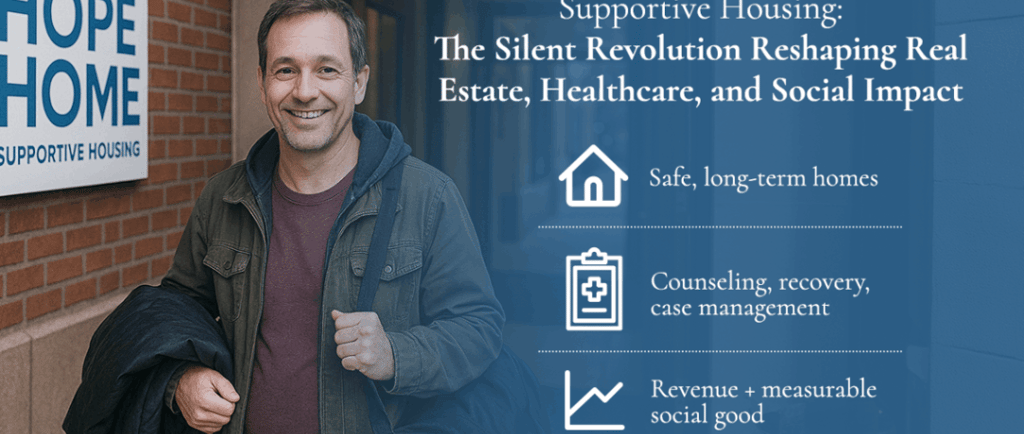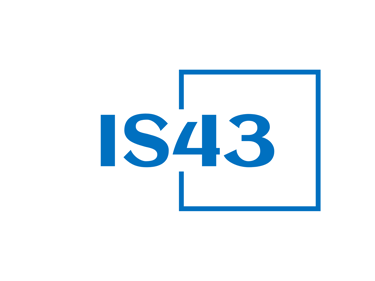Supportive Housing: The Silent Revolution Reshaping Real Estate, Healthcare, and Social Impact
5/1/20255 min read


Introduction
On a rainy night in Queens, a veteran named James stood outside yet another crowded shelter, rain dripping down his worn jacket. He had battled addiction, survived a traumatic brain injury, and cycled through hospitals that patched him up only to send him back to the streets. What he needed wasn’t just a bed—it was stability, care, and a chance to rebuild. In a world where Medicaid rules shift like sand, investors struggle to predict returns, and proving ROI while meeting ESG mandates feels like balancing on a tightrope. Supportive housing, however, can serve as a bridge over troubled waters, connecting vulnerable individuals to comprehensive care and secure homes. As Sheila McKechnie wisely observed, “People who are homeless are not social inadequate. They are people without homes,” reminding us that true solutions restore dignity, not merely shelter.
The Landscape of Supportive Housing
In cities from the bustling streets of New York to the overlooked blocks of Baltimore and Detroit, America’s housing crisis hums like an engine with dual pistons—one pushing for social good, the other for financial sustainability. At the Queens Supportive Housing Facility, adults navigating substance use recovery found more than a roof; they found a structured, recovery-oriented home where Medicaid billing and professional care created stability that traditional shelters could not. Within 30 days of obtaining the Medicaid insurance license, the 12-bed facility reached a 100% occupancy, generating $180,000 in monthly revenue while maintaining a monthly gross profit of $70,000+ proof that social impact and profitability could move in tandem. Despite meaningful gains in permanent supportive housing programs—such as improved health outcomes and reduced shelter use the system still struggles to meet demand. In Washington State, roughly 28% of people with complex medical and behavioral needs are not adequately served (Washington State Legislature). In addition, approximately 4% of veterans in the state were homeless or housing-unstable in 2018 (DSHS Washington). Expansion across three states, 85+ operational rooms, and nearly $10 Million in projected annual revenue highlighted the potential—but also the challenge: scaling supportive housing while aligning healthcare reimbursements with real estate returns, all while satisfying investors seeking ROI. Building these orchards, not just planting seeds, requires precision, patience, and the courage to navigate a landscape where every empty bed represents both a human need and a financial question.
Building Stability: How Permanent Supportive Housing Transforms Lives and Communities
Experts consistently define permanent supportive housing (PSH) as long-term, affordable housing paired with flexible, voluntary services, including healthcare, counseling, substance use treatment, and case management. Unlike shelters or halfway houses, PSH removes time limits and integrates supports tailored to complex needs, fostering lasting stability. Models vary: single-site complexes centralize services for high-acuity residents, while scattered-site units promote autonomy and community integration, though they can be logistically challenging. Evidence shows PSH significantly improves housing stability, health outcomes, and social functioning,
particularly for chronically homeless populations. Strategic partnerships with hospitals, Medicaid, and managed care organizations further amplify impact by aligning funding, referrals, and care coordination. For instance, HUD’s Green and Resilient Retrofit Program committed over $1.4 billion to modernize existing affordable housing—improving or preserving over 30,000 rental homes across 42 states, DC, and Puerto Rico (AP News). In addition, Welltower’s senior housing portfolio reported a standout 21.7% year-over-year gain in same-store net operating income in Q2 (S&P Global), suggesting that investment in socially responsible housing sectors like senior housing can yield strong financial performance.
A Pragmatic Response to Supportive Housing’s Toughest Questions
Critics of supportive housing raise valid concerns. Some argue that labeling housing as “permanent” risks dependency, limiting upward mobility, while the high costs of wraparound services may hinder scalability. Others note that single-site versus scattered-site distinctions oversimplify real-world complexities, with hybrid models often necessary; yet scattered-site residents may face landlord discrimination, and single-site arrangements can inadvertently concentrate stigma. Additionally, while supportive housing reduces emergency service use, long-term operational and healthcare costs remain substantial, leading some to question whether resources should focus on the highest-need individuals. Finally, healthcare partnerships—though valuable—can introduce conflicts of interest and political funding instability, potentially blurring social and medical roles.
IS43 addresses these challenges proactively. Our reintegration-focused model guides residents toward independent housing and employment, reducing costly cycles while maintaining ≥40% gross profit and Medicaid scalability. Hybrid facility portfolios balance intensive care with community integration, minimizing stigma and adapting to local markets. By shifting spending from reactive to proactive care, we are projecting $13 Million + in Healthcare receivables over 18 months, targeting high-need populations without displacing broader affordable housing. Strategic, diversified partnerships with hospitals and insurers align incentives, safeguard community control, and integrate healthcare support where needed—bridging debate with pragmatic, mission-aligned solutions.
Beyond Shelter: How Leading Organizations Merge Stability, Care, and Capital
Leading organizations offer valuable lessons for IS43’s approach. UnitedHealth Group leverages Low-Income Housing Tax Credits and social impact investments to fund supportive housing with integrated healthcare, focusing capital on high-need communities. Welltower demonstrates the power of market-aligned healthcare real estate, showing that strong investor returns can coexist with meaningful social impact. These examples reinforce IS43’s strategy of combining housing stability with Healthcare services. As Diane Yentel reminds us, “It has never been clearer that housing is healthcare.” This ethos guides our mission: creating homes that are more than shelter, reducing costly hospital visits, and delivering measurable social and financial value.
Turning Insight into Results: Scaling Housing with Purpose
In the haze of regulatory complexity and financial uncertainty, IS43 emerges as a lighthouse in the fog, guiding both residents and investors toward clarity and confidence. By aligning healthcare reimbursements with real estate returns, our licensed facilities bill Medicaid and insurers directly, creating predictable cash flow that fuels rapid expansion. In just 60 days from
launch, we reached 100% occupancy, generating over $180,000 in monthly revenue with a 45% gross profit margin—positioning us to scale to eight facilities and exceed $10 Million in projected annual revenue.
Across 18 states leveraging Medicaid Section 1115 waivers, these solutions prove that supportive housing can scale health-aligned interventions, improving access and outcomes. As Sam Tsemberis observed, “We made the assumption that housing would actually stabilize people”—a principle at the heart of IS43’s model. Here, housing is not a policy checkbox; it is a revolution, a tangible foundation where stability begets wellness, investment flourishes, and hope becomes measurable.
From Shelter to Strategy: The Lasting Power of IS43’s Model
As James settled into IS43’s supportive housing, the metaphorical storm that once threatened his life finally eased. What began as uncertainty and risk transformed into structure, care, and stability—a vivid reminder by David Wertheimer that “housing is the best medicine.” Within walls funded and guided by Medicaid, he accessed mental health counseling, substance use recovery programs, and consistent clinical support. These interventions didn’t just shelter him temporarily; they integrated healthcare with permanent housing, reducing costly ER visits and breaking cycles of homelessness. Today, James is a resident, a patient, a man with hope—and a testament to a scalable, durable, and profitable model that addresses homelessness, healthcare gaps, and investor goals simultaneously. In closing, the IS43 story reminds us that investing in housing is not charity—it is strategy, care, and transformation woven together, proving that real change is both measurable and meaningful.
Trusted Visionaries: Combining Experience, Care, and Results
At the forefront of IS43’s Supportive Housing Development & Operations, we specialize in acquiring, renovating, licensing, and operating facilities that seamlessly integrate healthcare and housing solutions. Our proven model ensures rapid occupancy, Medicaid reimbursement, and sustainable profitability, directly addressing America’s critical housing and behavioral health crises. Unlike traditional housing or shelters, we combine real estate expertise with healthcare integration, delivering scalable, high-margin facilities that provide stability, treatment, and measurable impact—while offering attractive returns for investors.
As a women- and minority-owned firm with decades of experience, we leverage public-sector networks, secured contracts, and regulatory expertise to accelerate licensing, occupancy, and reimbursement cycles. Our flagship Queens, NY facility reached 100% occupancy within 60 days, generating $180,000 + monthly revenue, while IS43 has secured $600Milion + in contracts and supported NYC’s COVID-19 first responder housing program, demonstrating unmatched capability in large-scale, socially impactful projects.
Leading this revolution is a team of builders, healers, and visionaries: Co-Founders Gwendolyn N. Davis and Martin Assoumou, Senior Advisor Dawn Davis, and Operations Leader Schelton Assoumou—together driving both strategic focus and financial discipline.
Reach us at 1 917-701-3432 | (929) 226-2165, https://is43consulting.com or visit our office at 1002 Dean Street, Suite #42, Brooklyn, NY 11238.
Contact Information
Expert guidance and strategic solutions for successful partnerships.
NEWSLETTER SIGN-UP
IS43 Consulting
(917-864-7720)
© 2024. All rights reserved.
579 Franklin Avenue Brooklyn, NY 11238
